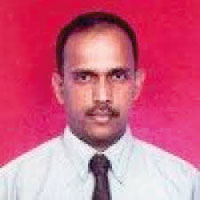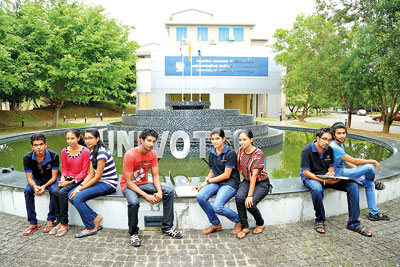University of Vocational Technology to Enroll 1500 Students in April 2019: The Earliest among National Universities
View(s):The University of Vocational Technology advertised for its 2019 intake for both weekday and weekend programmes, today, the 30th of December2018, will conduct the Aptitude Test in February, and will register students in early April, 2019. The University has called for applications from those who have NVQ qualifications and from those who have passedGCE AL examination 2018. We request the candidates to visit our website http://univotec.ac.lk/ throughout admission process for important announcements and more details of the degree programmes they wish to apply. They could apply online or senda duly completed application which could be downloaded from the same website, with other requirements stipulated in the advertisement.

Sudath Liyanage Senior Lecturer
With that prelude on the 2019 admission, let me share with you, the prospective students of our university, a brief background that will give you an idea of uniqueness of the University, its achievements and its future plans. I will start with a little anecdote:
Early December in 2017, I met a graduand of the Convocation thatwas to be held on, 21st of December, 2017.I had taught him in his first year. He is from the Bachelor of Technology in Building services (BST) programme. He had come to the University to collect the cloak. I casually asked “putha, what are you doing now” “Sir, I work at-(he mentioned a name of a famous company)”. Even though it is not polite to ask about one’s salary, I asked the question, prefixing a face saving phrase, and his answer was, “Sir,six figures.” I wanted to know more; “your colleagues?”, “they all have got jobs”. His face was beaming with pride and satisfaction. He was from NVQ stream; a path has thus been created for those who miss traditional “University Entrance’ to further their higher education within the free education system in Sri Lanka.
Then, a quote from the Convocation Address 2017, by the Chancellor of the University of Vocational Technology, the undisputed pioneer of the Institute, Vidyajothi, Emiritus Professor Dayantha S Wijesekera, could very appropriately be juxtaposed here.
‘During the past the University has been able to develop 13 Degree programmes. Some of these programmes have been subject to evaluation by the institution of Engineers Sri Lanka, which is the authorized Professional Body for Accreditation for Washington accord and Sydney Accordstatus. This was done with both expatriate and local experts, who have indicated that the degrees which were evaluated would be eligible subject to certain conditions, to be considered for Affiliate member status as indicated in the IESL website under the Sydney Accord as on October 2017.
This has been a great achievement perhaps the first of its kind in Sri Lanka, that the Institution of Engineers, Sri Lanka (IESL) has granted a conditional Accreditation for the three degree programmes namely, Building Services Technology, Manufacturing Technology and Mechatronics Technology. I as the Chancellor and a past President of the Institute, it gives me greaterjoy for this achievement of the university. While the academic industry would be largely satisfied with this category of members , for an academic career or research or very senior position in industry, with a post graduate degree in the relevant field they could qualify and rise up to being s Chartered engineer.”
University of Vocational Technology was established by the Parliamentary Act number 31 of 2008, repealing the National Institute of Technical education, which was then the apex body of the TVET sector that was responsible for Teacher Training, Curriculum Development and Learning Resource Development. The establishment of the University was in parallel to two other major metamorphoses in the entire TVET sector: one is the introduction of Competency Based Training (CBT) and Assessment; the other was establishing the National Vocational Qualification (NVQ) framework. These three programmes virtually ensured a leaping frog, resulting a paradigm shift in the country’s TVET sector within a comparatively short period.
NVQ framework streamlined the inconsistent procedures of assessment and certification in TVET programmes conducted by both public and private sector organizations, and more importantly identified a level that is equivalent to a Bachelor Degree, that t is NVQ Level seven. Hence was the birth of a University for the sector. The NVQ level 1-6 courses offer certificate, national diploma and higher national diploma qualifications, and such courses are conducted by institutes under Vocational Training Authority (VTA), National Apprentice and Industrial Training Authority (NAITA), Department of Technical Education and Training (DTET), and many private sector institutes. All such institutes are monitored by the Tertiary and Vocational Education Commission, attending to, assessment, quality assurance and accreditation of courses.
 The University offers thirteen degree programmes (NVQ Level 7) organized under two faculties namely the Faculty of Training Technology, and the Faculty of Industrial and VocationalTechnology. It is apt to here to quote how Prof. DharmasriWickramasinghe, the Vice Chancellor, summarises the achievements of the University in his Convocation message which is to be held on the 3rd of January 2019.
The University offers thirteen degree programmes (NVQ Level 7) organized under two faculties namely the Faculty of Training Technology, and the Faculty of Industrial and VocationalTechnology. It is apt to here to quote how Prof. DharmasriWickramasinghe, the Vice Chancellor, summarises the achievements of the University in his Convocation message which is to be held on the 3rd of January 2019.
“This convocation coincides with a number of significant achievements over the past two years. First, the number of students enrolled to an academic year was doubled by opening up admission to the GCE (AL) Technology Stream qualified students, which paved the way for utilizing the human and physical resources to the optimum level. Second, the University was able to obtain accreditation from the Institution of Engineers Sri Lanka (IESL) in 2017, under the Sydney accord, which is an international recognition for Engineering Technology Degrees; we were the first university to achieve this in Sri Lanka. The third is the fact that the University demonstrated a significant expansion of its academic staff both qualitatively and quantitatively, recruiting a quite a number of experienced professionals in their respective fields. Next, all measures have been taken to introduce the fourth year for the study programmes in order to raise the recognition of the degrees, and two new degree programmes in the fields of film and television, and hotel management, along with a master’s programme in the field of education will be new features in 2019. Parallel to such significant enhancements, it is heartening to see that our students compete with their counterparts and regularly perform brilliantly in national level competitions. A number of partnerships established both locally and globally during the past year will enhance the above furthermore.”
 By now the graduates produced by the University serve many parts of the country in various capacities and pursue higher studies in almost all national universities in Sri Lanka and overseas; the undergraduates compete handsomely in national level competitions rubbing shoulders with their counterparts in other universities bagging the trophies at times all first three places, which speaks volumes about the recognition of our degree programmes, and capacities of the studentship. The following are only a few instances.
By now the graduates produced by the University serve many parts of the country in various capacities and pursue higher studies in almost all national universities in Sri Lanka and overseas; the undergraduates compete handsomely in national level competitions rubbing shoulders with their counterparts in other universities bagging the trophies at times all first three places, which speaks volumes about the recognition of our degree programmes, and capacities of the studentship. The following are only a few instances.
- n Innovation Competition, 2012 -1st place , Mechatronics student
- n Innovation Competition, 2013 – 1st place , Mechatronics student
- n TECHNO 2014 – Bronze Medal Best University stall
- n ROBOFEST 2014 SLIIT – 1st Round 1st place
- n ROBOFEST 2015 SLLIT – Gold, Silver and 4th place among 42 groups of national Universities
- n Uva University “Robot Battles 2016” 1st,3rd and 4rt place
- n Kalaniya University 2017 ”VIDYA 2017” 1st 2nd 3rd Place
- n Open University 2017” OUSL IMPACTO 2017” 1st Place
- n Chromium Collision 2017 organized by Google I/O extended ,1st and 3rd Place
- n Uva University “Robot Battles 2018” Winner and 2nd Runner-up
The University of Vocational Technology is recognized by the University Grants Commission by virtue of the fact that the University has the membership of the Commonwealth University, and the fact that the University has its internal mechanism of accreditation and quality assurance through Faculty Boards, Industry Liaison Committees, Academic Council and Admission, Accreditation and Quality Assurance Council. However, the faculties have sought more recognition by getting their programmes accredited by reputed external bodies. One such instance, as has been mentioned earlier, isthat three degree programmes have obtained accreditation form Institute of Engineers, Sri Lanka, (IESL) under Sydney Accord. Other programmes too have identifiedrelevant external bodies and are in the process of obtaining accreditation.
The University of Vocational Technology has come of age. We have many to thank, and here the risk of missing any is not taken by mentioning them individually. We the University Community, students, academic staff, non-academic staff, parents, and industry personnel, univocally pay our gratitude to those who supported the forward march of this up and coming university. We have a fair assessment about the challenges ahead; we have a strong feeling that we can face them too, of course with the whole hearted support of our well wishes.


